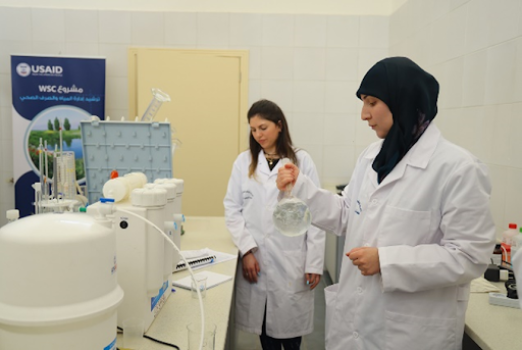Lebanon Water, Sanitation, and Conservation (WSC)
Despite ample natural water sources, Lebanon is a country in a state of “water impoverishment”. Inefficient water resources management (WRM) and deficient wastewater management capacity are jeopardizing the health of the Lebanese people, overwhelming the environment, and accelerating the depletion of Lebanon’s precious drinking water sources. Political instability has led the Government of Lebanon to pursue short-term solutions rather than undertake long-term strategic planning and management of its water resources. An acute economic crisis, the global COVID-19 pandemic, and the August 2020 Beirut port explosion have worsened the situation. Citizens have protested in the streets over limited economic opportunity, and unreliable basic government services. The combination of the distrust in public institutions, social volatility, political instability, and severe economic plight has further weakened public water utilities (i.e., the Regional Water Establishments [RWEs] and the Litani River Authority [LRA]), which were already in dire financial circumstances.
Activity Description
Drawing on the work achieved by the Lebanon Water Project (LWP), the Lebanon Water, Sanitation, and Conservation (WSC) Project is a five-year project funded by the United States Agency for International Development (USAID) with the objective to engage citizens and the private sector to enhance their water stewardship, increase efficiency in the protection of water resources, and improve water and wastewater services to around 600,000 people by expanding the capacity of public water utilities and local governments to treat wastewater. WSC specifically engages with the five public water utilities across Lebanon: the Litani River Authority, mandated to manage the waters of the Litani River and Qaroun Lake, and the four Regional Water Establishments (RWE)s—corresponding to four defined regions—which bear responsibility for supplying potable and irrigation water, and managing wastewater.
WSC aims to achieve enhanced conservation and protection of Lebanon’s water resources through three objectives: 1) expanding the capacity of wastewater (WW) and sanitation management; 2) increasing the efficiency of public water utilities to manage water resources i; and 3) enhancing citizens’ water stewardship.
The WSC Year 1 work plan reflects necessary adaptations to the original scope of work for Year 1 to provide critical crisis response support to the water and wastewater sector with well-chosen and strategic interventions. To this end, and in close consultation with the USAID/Lebanon contracting officer’s representative (COR), WSC developed a Crisis Response Road Map to be used during Year 1 work plan. The Road Map is based on three major pillars as follows:
- Pillar 1: Procurement and supply of tools, spare parts, and equipment for critical operation and maintenance (O & M) services.
- Pillar 2: Supporting and funding O&M contracts of critical Regional Water Establishment (RWE) facilities; and
- Pillar 3: Identifying, Designing and Building Photovoltaic (PV) Solar Power Systems for both Water and Wastewater facilities.
Expected Outcomes
WSC is expected to increase the volume of wastewater treated, reduce the pollution and water losses that harm water sources, improve service delivery to citizens, and facilitate partnerships between public water utilities, municipalities, the private sector, civil society organizations, and citizen groups to introduce innovative solutions and improve governance in the water and wastewater sector across Lebanon. Further, WSC will:
- Rehabilitate, upgrade, and expand wastewater systems.
- Implement water safety plans.
- Promote water reuse and conservation in the industrial sector.
- Reduce the regional water establishments’ non-revenue water losses.
- Improve public utility planning and management tools.
- Conduct social marketing campaigns to increase civic engagement in water management.
- Promote wastewater or sludge reuse opportunities for the agricultural sector.
Highlights from Year 1
- WSC finalized infrastructure assessments and completed the IDIQ process prequalifying six Lebanese engineering firms to provide design and supervision inputs to WSC projects.
- WSC launched design works for all infrastructure projects identified in its Batch 1 list of projects in support of the RWEs
- In association with the WRM subcontractor, WSC conducted rapid assessments for all four RWEs and prepared a crisis response management plan
- Implementation of O&M contracts for the wastewater facility at Roum Constructed Wetland began, benefiting 1640 individuals from Roum village, and treating a daily average volume of 432m3/day of wastewater. WSC also launched a technical assessment for 4 other WWTP to provide proper information prior to engaging in O&M contracts for these plants.
- WSC launched tenders to contract qualified operator(s) for three NRW demonstration areas in preparation for outsourcing Water Demand Management (WDM) contracts to the private sector leading to reductions in NRW rates.
- WSC conducted meetings with the private sector and farmers to determine interest (or barriers) to engage in pilot initiatives covering reuse of treated sewage effect or wastewater sludge.
- WSC met with 68 municipalities in 6 unions of municipalities in the Bekaa to discuss updating municipal action plans related to priority water and wastewater projects.
- WSC launched a CSO-targeted grants program during an online session attended by over 200 stakeholders including universities, civil society organizations, NGOs, and the private sector. WSC launched one RFA and one APS to engage schools and women/youth in water and sanitation.
- WSC launched a private sector grant program aiming to engage industries in water conservation and protection.
- WSC launched communication activities to support RWEs and LRA in reaching out to their customers’ and delivering strategic messages in times of crisis.
- Building on previous USAID investments, WSC launched extended technical assistance to RWEs in support of Enterprise Resource Planning (ERP) implementation and integration processes.
Related Resources
- Lebanon Water Project (LWP) - predecessor project to WSC


